Related Research Articles

Lupin III: The Castle of Cagliostro is a 1979 Japanese animated action adventure comedy film co-written and directed by Hayao Miyazaki. It is the second animated feature film based on the 1967–69 manga series Lupin III by Monkey Punch. The film was Miyazaki's feature directorial debut after having previously worked as an animator for Toei Animation and Telecom Animation Film, and directing several animated television series, including Lupin III Part I.
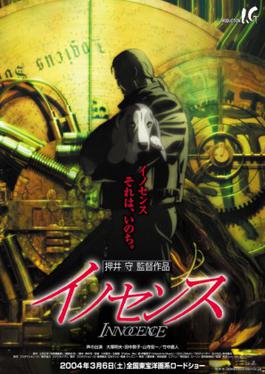
Ghost in the Shell 2: Innocence, known in Japan as just Innocence, is a 2004 Japanese animated cyberpunk film written and directed by Mamoru Oshii. The film serves as a standalone sequel to Oshii's 1995 film Ghost in the Shell and is loosely based on the manga by Masamune Shirow.
Nikkatsu Corporation is a Japanese film studio located in Bunkyō. The name Nikkatsu amalgamates the words Nippon Katsudō Shashin, literally "Japan Motion Pictures".
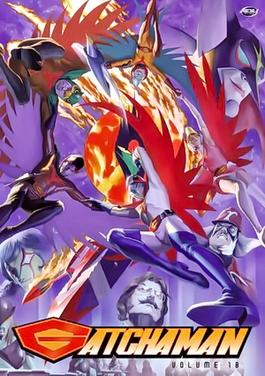
Science Ninja Team Gatchaman is a Japanese animated franchise about a five-member superhero ninja team created by Tatsuo Yoshida and produced by Tatsunoko Productions. The original anime series, which debuted in 1972, was eponymously entitled Kagaku Ninja-tai Gatchaman and is best known in the English-speaking world as the adaptation entitled Battle of the Planets (1978). The series had additional English adaptations with G-Force: Guardians of Space (1986) and 2005 ADV Films uncut release. Tatsunoko also uses the official translation Science Commando Gatchaman in related products and media.

Godzilla 2000: Millennium is a 1999 Japanese kaiju film directed by Takao Okawara, with special effects by Kenji Suzuki. Distributed by Toho and produced under their subsidiary Toho Pictures, it is the 24th film in the Godzilla franchise, Toho's 23rd Godzilla film, and the first film in the franchise's Millennium era. The film stars Takehiro Murata, Hiroshi Abe, Naomi Nishida, Mayu Suzuki, and Shirō Sano, with Tsutomu Kitagawa as Godzilla and Makoto Itō as Orga. Ignoring the continuity of all previous Godzilla films except the original 1954 film, it follows a group tracking Godzilla while an alien UFO appears and poses a new threat to Japan.
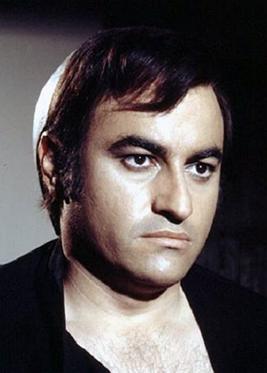
Jacinto Molina Álvarez known by his stage name Paul Naschy, was a Spanish film actor, screenwriter, and director working primarily in horror films. His portrayals of numerous classic horror figures—The Wolfman, Frankenstein's monster, Count Dracula, Quasimodo, Fu Manchu and a mummy—earned him recognition as the Spanish Lon Chaney. Naschy also starred in dozens of action films, historical dramas, crime films, TV shows and documentaries. He also wrote the screenplays for most of his films and directed a number of them as well, signing many of them "Jacinto Molina". Naschy was bestowed Spain's Gold Medal of Merit in the Fine Arts in 2001.
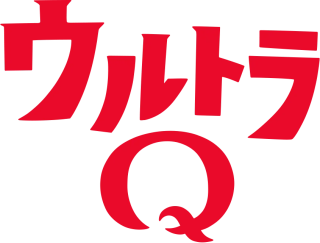
Ultra Q is a 1966 Japanese tokusatsukaiju television series created by Eiji Tsuburaya. Produced by Tsuburaya Productions, it is the first entry in the long-running Ultraman franchise and was broadcast on Tokyo Broadcasting System (TBS) from January 2 to July 3, 1966, with a total of 28 episodes. This series was followed two weeks later by the more popular Ultraman (1966), the second entry in the franchise.

Gamera vs. Barugon is a 1966 Japanese kaiju film directed by Shigeo Tanaka, with special effects by Noriaki Yuasa and Kazufumi Fujii. Produced by Daiei Film, it is the second entry in the Gamera franchise, and stars Kōjirō Hongō, Kyōko Enami, and Yūzō Hayakawa, with Teruo Aragaki as Gamera. In the film, Gamera returns to Earth to battle a reptilian monster born out of an opal brought to Japan by greedy entrepreneurs.
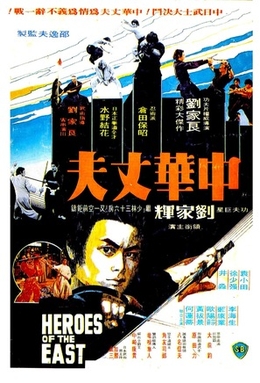
Heroes of the East, also known as Challenge of the Ninja, Shaolin vs. Ninja, and Shaolin Challenges Ninja, is a martial arts film produced in 1978. It starred Gordon Liu and was directed by Lau Kar-Leung. Lau Kar-Leung has a cameo role as So Chan, a master of Zui Quan. The film is notable for portraying Japanese martial arts alongside the more typical kung fu used in most Hong Kong martial arts films.
Alien is a science fiction horror and action media franchise centered on the original film series which depicts warrant officer Ellen Ripley and her battles with an extraterrestrial lifeform, commonly referred to as the Alien ("Xenomorph"), and the prequel series following the exploits of the David 8 android and the aliens referred to as the "Engineers".

Charles de Lauzirika is an American DVD and Blu-ray producer and filmmaker.

Monsters vs. Aliens is a 2009 American animated science fiction action comedy film produced by DreamWorks Animation and distributed by Paramount Pictures. The film was directed by Conrad Vernon and Rob Letterman from a screenplay written by Letterman, Maya Forbes, Wallace Wolodarsky, and the writing team of Jonathan Aibel and Glenn Berger based on a story by Vernon and Letterman. Featuring the voices of Reese Witherspoon, Seth Rogen, Hugh Laurie, Will Arnett, Kiefer Sutherland, Rainn Wilson, Paul Rudd, and Stephen Colbert, the film involves a group of misfit monsters hired by the United States Armed Forces to stop the invasion of an extraterrestrial villain and save the world in exchange for freedom.

Predator is an American science fiction action horror anthology media franchise centered on a film series depicting humankind's encounters with an intelligent race of extraterrestrial trophy-seeking hunters known as the Yautja. Produced and distributed by 20th Century Studios, the series began with Predator (1987), directed by John McTiernan, and was followed by three sequels, Predator 2 (1990), Predators (2010), The Predator (2018), and one prequel, Prey (2022). The series has led to numerous novels, comics, and video game spin-offs such as Predator: Concrete Jungle (2005) and Predator: Hunting Grounds (2020). The Alien vs. Predator franchise combines the continuities and universe of the Alien franchise with the Predator franchise and consists of two films as well as varying series of comics, books, and video games. Unlike the Alien franchise, which features a continuous story arc, the Predator films are more non-linear, instead focusing on individual encounters with the Predators spread across multiple timeframes.
There are two feature films based on the manga and anime series Yu Yu Hakusho by Yoshihiro Togashi. The films were produced by Studio Pierrot and released in Japan theatrically, the first Yu Yu Hakusho: The Movie in 1993 and the second Yu Yu Hakusho the Movie: Poltergeist Report in 1994. Before Funimation Entertainment acquired the rights to the anime in 2001, the films were dubbed and released in North America by two other companies. The first by Anime Works and the second by US Manga Corps, both released in 1998. However, the first film and the OVAs have since been acquired by Funimation and they produced a new English dub of the film using their original cast from the anime. These were released together as Yu Yu Hakusho: The Movie & Eizou Hakusho on December 13, 2011.

The Machine Girl is a 2008 Japanese horror action comedy film written and directed by Noboru Iguchi, and starring Minase Yashiro, Asami, Kentarō Shimazu and Honoka. The plot follows an orphaned Japanese schoolgirl whose life is destroyed when her brother is killed by a son of a Ninja-Yakuza clan. When her hand is cut off, she replaces it with a makeshift machine gun and seeks revenge.
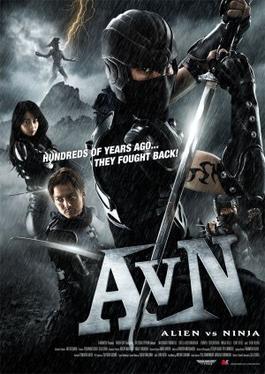
Alien vs Ninja (エイリアンVSニンジャ), also known as AvN, is a 2010 Japanese martial arts science-fiction comedy film written and directed by Seiji Chiba.
Seiji Chiba is a Japanese film director and producer.
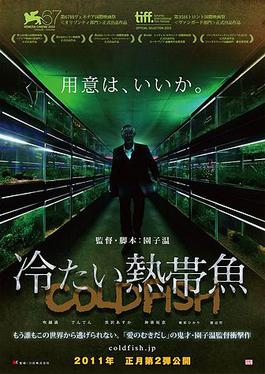
Cold Fish is a 2010 Japanese film directed by Sion Sono. Cold Fish premiered at the 67th Venice International Film Festival on September 7, 2010, and received the best screenplay award in the Fantastic Features section at Fantastic Fest 2010. The film was released as part of the Bloody Disgusting Selects line.

Another World Entertainment is a Danish home video distribution company and sports platform.
Vinegar Syndrome is an American home video distribution company which specializes in "protecting and preserving genre films". The company was founded in 2012 in Bridgeport, Connecticut by Joe Rubin and Ryan Emerson, who created it to restore and distribute old X-rated films that were lost or otherwise unavailable. Their catalog has since expanded to include other types of cult and exploitation films, including horror films and action films.
References
- ↑ "About: Sushi Typhoon". Sushi Typhoon. Retrieved June 13, 2011.
- ↑ "Yoshinori Chiba: Sushi Typhoon". Sushi Typhoon. Retrieved June 13, 2011.
- ↑ "Films: Sushi Typhoon". Sushi Typhoon. Retrieved June 13, 2011.
- ↑ "Sushi Typhoon Preview Reel". YouTube. Retrieved June 13, 2011.
- ↑ "Staff: Sushi Typhoon". Sushi Typhoon. Retrieved June 13, 2011.